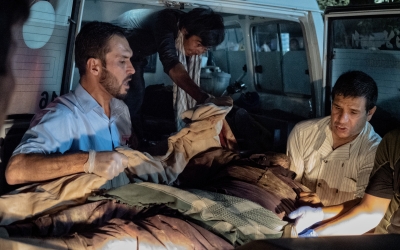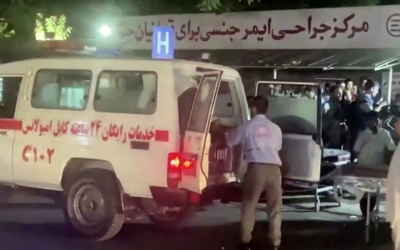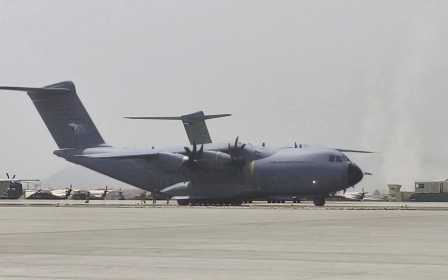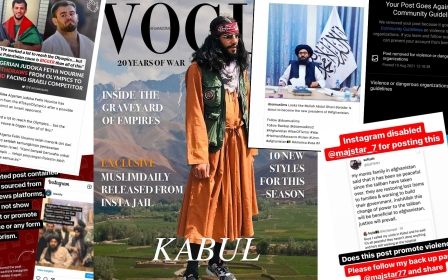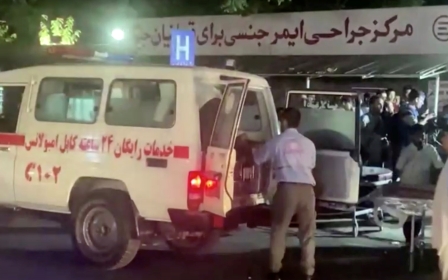Afghanistan: What links do IS-K have to the Middle East?
Scores of Afghans desperate to leave the country were killed on Thursday as they waited in line with their bags in sewage canals outside Kabul's Hamid Karzai International airport.
At least 170 civilians were killed, local media reported, with dozens more injured by the detonation of two suicide bombers and shots fired by the gunmen who accompanied them.
According to Reuters, 13 American soldiers and 28 Taliban fighters stationed to guard the airport were also killed in the attack.
The attack was claimed by the Islamic State in Khorasan Province (IS-K), the local affiliate of the Islamic State group in Afghanistan and Central Asia.
But who are IS-K, and do they have any links with the Islamic State group in the Middle East?
New MEE newsletter: Jerusalem Dispatch
Sign up to get the latest insights and analysis on Israel-Palestine, alongside Turkey Unpacked and other MEE newsletters
Who are IS-K?
IS-K, also known as IS-KP and ISIS-KP, was founded in 2015 at the height of the Islamic State group's control of swathes of Iraq and Syria.
Formed primarily of disaffected Taliban fighters from Afghanistan and Pakistan, the group has staged dozens of attacks in both countries.
The group says it "disregards international borders" with the K in its name standing for Khorasan, the traditional name given to parts of Central Asia, Iran, Afghanistan and Pakistan.
Analysts note that IS-K at its peak had at least 3,000 to 4,000 fighters, but that number has reduced significantly due to fighting with US forces, Afghan Special forces and the Taliban.
But Pentagon spokesperson John Kirby confirmed on Friday that thousands of IS-K members were freed from prison when the Taliban took control of Afghanistan.
Do they have links to IS in the Middle East?
Since its inception, IS-K in Afghanistan has been viewed as a major arena for the Islamic State leadership, especially after its fall in Iraq and Syria.
The group has received hundreds of thousands of dollars from the IS leadership in the Middle East to improve its network and infrastructure in Central Asia.
US officials have also described IS-K as the strongest offshoot of the Islamic State group outside of Iraq and Syria due to their cash on hand and number of personnel, including foreign fighters from the region being sent to Afghanistan.
UN officials have also noted that the "[ISIS] core continues to facilitate the relocation of some of its key operatives to Afghanistan", from the Middle East, including Abu Qutaiba, the Islamic State’s former leader in Iraq's Salah al-Din province.
And despite the group's loss of territory in the Middle East, members of IS-K have remained loyal to the militant group, having pledged allegiance to the group's new leader, Abu Ibrahim al-Hashimi al-Qurayshi.
Hashmat Moslih, a former adviser to Afghan President Burhanuddin Rabbani and an independent analyst on Afghanistan, describes ISIS-KP as having a "direct link" to IS leadership in the Middle East.
"ISIS as an organisation is highly centralised and purpose driven - they are very much in contact with each other," Moslih told Middle East Eye.
"And Western intelligence organisations as a public relations ploy often depict ISIS as fragmented branches with only 'affiliation' to ISIS in the Middle East to show they are different."
Does IS-K have links to other militant groups?
Moslih disputes the claim that IS-K has links or ties to other militant groups outside of the Islamic State group bubble.
He argues that the group "does not create or go into alliances" as they believe in absolute allegiances.
"ISIS, by its very nature, demands its offshoots and branches follow their rules and commands while maintaining absolute central command," said Moslih.
"So the idea that they have splinter groups who operate independently is not true. They wait for other groups to crumble and then encourage their disillusioned members to join ISIS.
"They are also heavily opposed to [tribal power structures] - due to their own self-interest. ISIS in Khorasan always make sure they have representation [from] tribes to ensure they are stakeholders in whatever they want to establish," noted Moslih.
"The group have learned from the experience of Iraq that tribal elders could easily switch sides and make deals with governments, so ISIS is against tribes. They want the population to be directly linked to them, with no middleman such as tribal heads."
Middle East Eye delivers independent and unrivalled coverage and analysis of the Middle East, North Africa and beyond. To learn more about republishing this content and the associated fees, please fill out this form. More about MEE can be found here.


